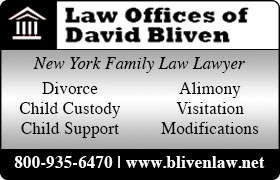Jefferson Valley Divorce & Family Law Lawyer, New York
Sponsored Law Firm
-
 x
x

Click For More Info:
-
The Law Offices of David Bliven
445 Hamilton Avenue, Suite 607, White Plains NY, 10601 » view mapFamily Law, Divorce, Child Support, Custody Representing All of Your Family Law Needs
With over 17 years of experience helping people through difficult family law issues, we have the knowledge and skill needed to ensure you and your children are protected.
914-861-4805  David Bliven White Plains, NY
David Bliven White Plains, NYAttorney At Law - New York, 1998
New York Law School, J.D. - 1997
 About Us
About Us16 years of experience helping people of Greater White Plains and the Bronx, New York with Family Law issues.
 Our ServicesAll Family Law
Our ServicesAll Family LawCivil unions, marriages, divorces, adoption, prenuptial agreements, child custody, and property settlements.
William J Bolger
Adoption, Alimony & Spousal Support, Criminal, Child Support
Status: In Good Standing
Alan David Feller
Industry Specialties, Estate, Divorce & Family Law, Civil & Human Rights
Status: In Good Standing Licensed: 23 Years
Albert Joseph Durante
Child Custody, Divorce & Family Law, Personal Injury, Car Accident
Status: In Good Standing
Alfred F.M. de Prado
Estate, Lawsuit & Dispute, Divorce & Family Law, Criminal
Status: In Good Standing
FREE CONSULTATION
CONTACTAlfred F. Deprado
Commercial Real Estate, Litigation, Family Law, Criminal
Status: In Good Standing Licensed: 59 Years
Audrey Jean Parma
Education, Real Estate, Estate, Divorce
Status: In Good Standing Licensed: 14 Years
Christine Marie Murphy
Estate, Divorce & Family Law, Criminal, Personal Injury
Status: In Good Standing Licensed: 9 Years
Christopher John Mullane
Motor Vehicle, Estate, Child Custody, Criminal
Status: In Good Standing Licensed: 20 Years


 David Bliven White Plains, NY
David Bliven White Plains, NY About Us
About Us Our ServicesAll Family Law
Our ServicesAll Family Law
